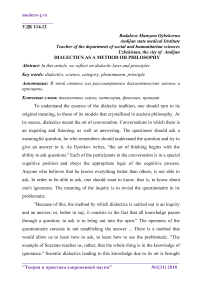Dialectics as a method oh philosophy
Автор: Badalova M.O.
Журнал: Теория и практика современной науки @modern-j
Рубрика: Основной раздел
Статья в выпуске: 1 (31), 2018 года.
Бесплатный доступ
In this article, we reflect on dialectic laws and principles.
Dialectics, science, category, phenomenon, principle
Короткий адрес: https://sciup.org/140289415
IDR: 140289415
Текст научной статьи Dialectics as a method oh philosophy
To understand the essence of the dialectic tradition, one should turn to its original meaning, to those of its models that crystallized in ancient philosophy. At its source, dialectics meant the art of conversation. Conversations in which there is an inquiring and listening, as well as answering. The questioner should ask a meaningful question, he who remembers should understand the question and try to give an answer to it. As Ilyenkov writes, "the art of thinking begins with the ability to ask questions." Each of the participants in the conversation is in a special cognitive position and obeys the appropriate logic of the cognitive process. Anyone who believes that he knows everything better than others, is not able to ask. In order to be able to ask, one should want to know, that is, to know about one's ignorance. The meaning of the inquiry is to reveal the questionnaire in its problematic.
"Because of this, the method by which dialectics is carried out is an inquiry and an answer, or, better to say, it consists in the fact that all knowledge passes through a question: to ask is to bring out into the open." The openness of the questionnaire consists in not establishing the answer ... There is a method that would allow us to learn how to ask, to learn how to see the problematic. "The example of Socrates teaches us, rather, that the whole thing is in the knowledge of ignorance." Socratic dialectics leading to this knowledge due to its art is brought into confusion on, thereby creating conditions for of asking. "
The intellectual efforts of the respondent, connected with the search for an answer, is the path to knowledge. After all, and in its original meaning "knowledge" is the presence in our minds of the answer to the question posed. The answer suggests that the interlocutor has a set of possible answers from which he must make a choice in favor of one of them. The justified choice is the solution of the problem. We can not judge the truth of the interlocutor's statement if we do not know and do not understand the question, the answer to which he is. Any objection to the answer, carried out from any other point of view, is unacceptable. That is why, when we criticize certain provisions of past philosophical systems, we must first clearly understand the answer to which questions they are.
Dialectics is the art of inquiry as a method of seeking truth. Therefore, one who knows how to ask, should direct the conversation deep into the problem, without deviating to the side, and on arguments to put forward counterarguments. The art of inquiry is, therefore, the art of thinking in its true freedom, in its openness to the truth.
"Knowledge can only be from the one who has questions, the questions always grasp the opposites between" yes "and" no ", between" so "and" otherwise. "Only because knowledge in a broad sense of the word is dialectical is possible in general" dialectic, "consciously making the opposite between" yes "and" no "subject."
The dialectic of thinking is directly connected with the collision of two opposing judgments, with a contradiction. Dialectics is the search for truth in the free object and language space of thought, in which speech and contradiction constantly collide. Such is the dialectic of Socrates and Plato.
In the Middle Ages, dialectical art reveals itself in those numerous philosophical debates in which it was customary to cite not only all the pros and cons before you express your views on the subject of the dispute, but also with seriousness to develop all the arguments in general, as though assessing their weight and thoroughness.
In modern times, a peculiar variant of dialectics is being developed in the framework of his doctrine of monadology, Leibniz. But Kant's research attracted special attention in this respect. This is primarily about the famous Kantian "antinomies," a detailed analysis of which will be given in the next chapter. Now we only note that the Kantian doctrine of antinomies once again attracted attention to dialectics as a fundamental problem of philosophy.1
Used sources:
1. Исмоилов Т. И. ЗАДАЧИ ФОРМИРОВАНИЯ ИДЕОЛОГИЧЕСКОГО ИММУНИТЕТА В ПРОЦЕССЕ ГЛОБАЛИЗАЦИИ //Теория и практика современной науки. – 2017. – №. 5. – С. 328-330.
Список литературы Dialectics as a method oh philosophy
- Исмоилов Т. И. ЗАДАЧИ ФОРМИРОВАНИЯ ИДЕОЛОГИЧЕСКОГО ИММУНИТЕТА В ПРОЦЕССЕ ГЛОБАЛИЗАЦИИ //Теория и практика современной науки. - 2017. - №. 5. - С. 328-330.


